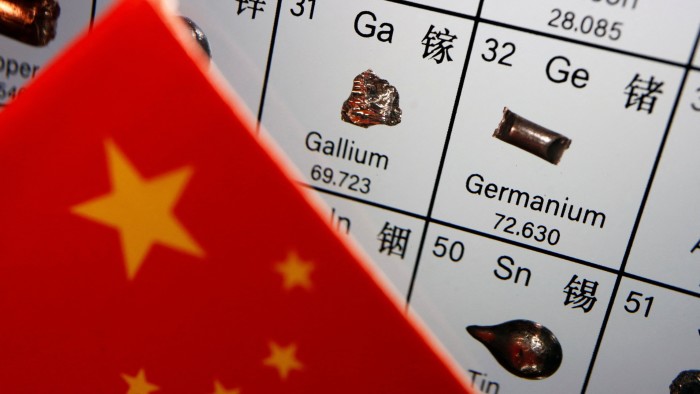Open the Editor’s Digest totally free
Roula Khalaf, Editor of the feet, picks her preferred stories in this weekly newsletter.
China has actually prohibited deliveries to the United States of a number of “dual-use” minerals and metals utilized in semiconductor production and military applications, in a fast retaliation by Beijing versus export curbs from Washington that pressed the shares of a leading Chinese tech business down 10 percent.
China’s commerce ministry on Tuesday stated it would not allow the export of dual-use products associated with gallium, germanium, antimony and superhard products to the United States, which it would execute more stringent controls for graphite-related products.
” The United States has actually expanded the principle of nationwide security, politicising and weaponising trade and innovation problems, and mistreated export control steps,” it stated in a declaration.
” To secure nationwide security. China has actually chosen to enhance export controls on dual-use products to the United States,” it included, keeping in mind that the steps would work instantly.
4 significant Chinese market associations, representing the web, automobile, semiconductor and interactions markets, responded to the United States relocations by getting in touch with their members to lower purchases of United States semiconductors.
” United States chip items are no longer safe or dependable, and pertinent Chinese markets must beware in acquiring United States chips,” stated the China Semiconductor Market Association.
The embargoed minerals and metals are utilized in the production of semiconductors and batteries, in addition to interactions devices parts and military hardware such as armour-piercing ammo.
Beijing had actually currently been enhancing controls on their export in reaction to tightening up western chip sanctions, with its curbs on deliveries of germanium and gallium causing a nearly twofold boost in the minerals’ rates in Europe.
China’s newest delivery restriction to the United States explains President Xi Jinping’s federal government wants to target western financial interests to counter versus Washington’s chip limitations.
It likewise highlights Beijing’s supremacy of the international supply of lots of essential resources. China produces 98 percent of the world’s supply of gallium and 60 percent of germanium, according to the United States Geological Study.
Washington on Monday enforced a series of brand-new sanctions created to slow the advancement of China’s semiconductor market.
They consist of harder limitations on the export of important semiconductor production tools and a restriction on the export to China of innovative high bandwidth memory (HBM) chips, an important part in expert system items.
However Bernstein experts stated the United States limitations were usually less serious than anticipated. Japanese chip devices providers were viewed as taking advantage of the tighter limitations, with chip stocks leading the Nikkei share average to a three-week high up on Tuesday. Tokyo Electron increased 4.3 percent, and Disco Corp and Lasertec were up 6.1 percent and 4.3 percent respectively.
Washington likewise included 136 Chinese business to a United States trade blacklist, consisting of significant Apple and Samsung provider Wingtech, which had actually been working to purchase up foreign semiconductor innovation.
Considering That 2018, Wingtech has actually invested more than $4bn getting Dutch semiconductor group Nexperia. It likewise shopped Newport Wafer Fab, Britain’s biggest chipmaker, in an offer eventually obstructed by the UK federal government.
The United States blacklisting sent out Wingtech’s Shenzhen-listed shares moving more than 10 percent over 2 days and highlighted the fragile balancing act for Chinese business in between growing their worldwide company and supporting Beijing’s policy top priorities in your home.
Wingtech had actually formerly purchased an Apple-related electronic camera module company from another Chinese group after it was struck with sanctions in 2020.
” Western business no longer purchase from us,” stated a supervisor at one blacklisted Chinese company. “For 2 years, we generally stopped growing as we changed foreign parts.”
Charlie Chai, of 86Research, stated Wingtech might be broken up if needed to keep foreign company. He kept in mind that the most recent United States controls closed loopholes making it harder for Chinese chip business to purchase foreign devices.
” It has actually become a traditional video game of feline and mouse, however the space for manoeuvring is quick diminishing for Chinese companies,” he stated.
Wingtech did not instantly react to an ask for remark. Nexperia stated the United States controls did not use to it or its subsidiaries.
Reporting by Ryan McMorrow and Eleanor Olcott in Beijing, Christian Davies and Tune Jung-a in Seoul, Harry Dempsey in Tokyo and Andy Bounds in Belgium


